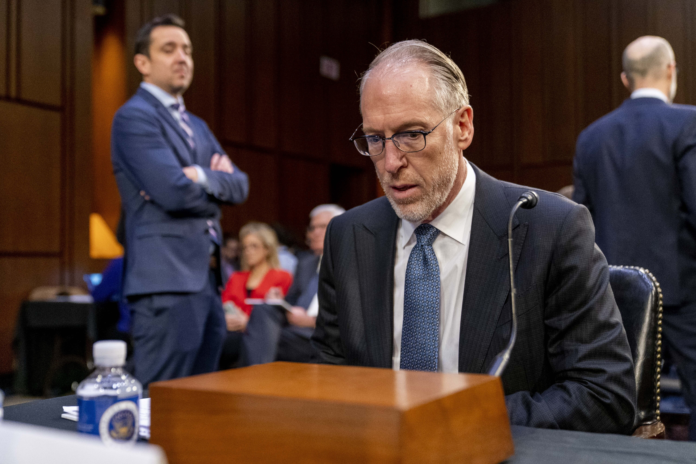The decision on whether to sue Ticketmaster could hinge in part on resource constraints. Antitrust prosecutors already have a busy fall, with trials scheduled to start in September against Google’s search business and in October to block the merger between JetBlue and Spirit Airlines.
The DOJ is also in the midst of late-stage investigations of companies including Apple and Visa, and mergers including Adobe’s takeover of design software company Figma.
Ticketmaster is a perennial target for lawmakers, regulators and music fans, and the latest wave of criticism centered last fall on the botched sale of concert tickets for Taylor Swift. But the Swift debacle is unrelated to the DOJ’s investigation, which began in earnest last summer, according to the people. In Senate testimony earlier this year Live Nation President and finance chief Joe Berchtold pinned the Taylor Swift situation on a cyberattack, but critics have said it’s evidence of a company with no real competition and, therefore, little motivation to offer a quality service.
Live Nation executives were told early on that the investigation is largely focused on the Ticketmaster side of the business, and the DOJ has asked questions on topics including prohibitions on reselling tickets and exclusive deals with venues to only use Ticketmaster, according to a separate person with knowledge of the matter. The DOJ has also asked questions about contracts for artist tours, that person said.
Ticketmaster is the largest ticketing company in the U.S. However, it maintains its market share has fallen in recent years and is now significantly less than the 80% alleged by the DOJ in its 2010 case against the initial deal that merged Ticketmaster and Live Nation. It says companies including SeatGeek, AEG and Paciolan are chipping away at its dominance, and the company estimates it controls just half of the market if sporting events are factored in, that separate person said.
A Justice Department spokesperson declined to comment.
The company maintains it’s still early on in the process. “We’re in regular contact with the DOJ and they haven’t told us they think we’re doing anything illegal or asked us to address any concerns,” Dan Wall, Live Nation’s executive vice president for corporate and regulatory affairs, said in a statement. “It would be highly irregular for the DOJ to file without that notice and a lot of dialogue afterwards. However, if they do file we are prepared to defend ourselves.”
While the investigation has gained steam in recent months, Live Nation has been under federal oversight since 2010 after it merged with Ticketmaster. As part of a settlement with the government that allowed the deal to close, the companies agreed to sell off some ticketing assets, license its ticketing software and not force venues to use Ticketmaster. That settlement expired in 2020.
Live Nation settled with the DOJ again in late 2019 over violations of the earlier agreement. The DOJ accused the company of using its dominant position in the live music industry to force artists and venues to use both its ticketing and concert promotion services. As part of the new agreement, the company agreed to extend court oversight via an independent compliance monitor through 2025.
A lawsuit is not expected to focus on violations of the past settlement, two of the people with knowledge said.
For its part, no Live Nation executives have been deposed by the DOJ, and the company is still in the early stages of its cooperation with the government, including ongoing negotiations over what documents and other information to turn over, according to two of the people with knowledge of the matter.
The DOJ is moving quickly, however, and its litigation team is involved, two people said. Jonathan Kanter, the DOJ’s antitrust head, has said one of his goals is to speed up the investigative process and bring cases to trial more quickly. Merger challenges are typically investigated and litigated on tight timelines, while so-called conduct probes like the Ticketmaster matter can take years before a case is filed.
Because of the federal scrutiny dating back more than a decade and the voluminous information the government is getting from third parties, it might not be necessary to have all of the information that the DOJ is seeking from the company in advance of filing a lawsuit, the three people with knowledge of the case said. Instead the DOJ could seek that information during the discovery process.
Kanter has said repeatedly that he prefers to litigate rather than settle enforcement actions and has indicated a preference for so-called structural remedies, such as separating lines of business, rather than behavioral fixes, which include promises not to engage in certain types of conduct.
And the DOJ is not alone. A bipartisan group of state attorneys general including California, Florida, Nebraska and Massachusetts were involved in the DOJ’s earlier cases, and a group of states could potentially join a case.
The company has also drawn Congress’ ire. Sen. Amy Klobuchar (D-Minn.), who leads the Senate Judiciary antitrust subcommittee, along with other Senate Democrats urged the DOJ to seek a breakup if its probe finds anticompetitive conduct. And at the Senate hearing in January, Sen. Mike Lee (R-Utah) questioned the wisdom of allowing the Live Nation-Ticketmaster merger to happen.


